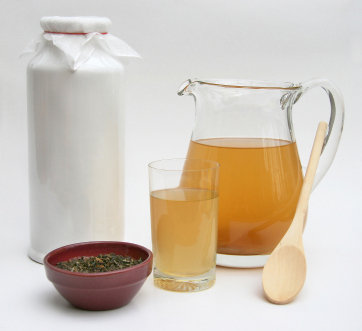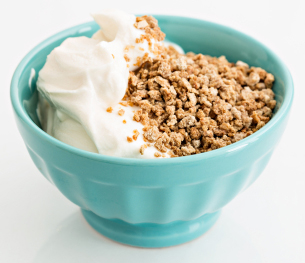Slimming Fermented Foods
Fermented foods aren't just full of flavor – they also promote gut health and boost the immune system, and they may be a key to becoming slim and trim.

Fermentation creates strong flavors, and it is a process often used for gourmet foods, some of which have become important in various cultures. Sour pickles, for instance, are soaked with salted liquid, and no vinegar is used. The sourness comes from the fermentation process, which causes lactic acid to be formed by bacteria. Strong flavors are produced, and many people need to acquire a taste for that flavor. Before refrigerators, fermentation was used to preserve food. It was and still is a way to preserve quality without refrigeration or added chemicals.
Yogurt is by far the most commonly known and widely available probiotic food in the United States. Similar to a yogurt drink, kefir is fermented milk that contains several major strains of bacteria, as well as some beneficial yeast not found in yogurt. The live cultures act to predigest lactose, so it’s a great dairy source for those who are lactose intolerant. It can also be made from coconut milk, coconut water, or even sweetened water. It is one of the best sources of probiotics because of its sheer potency.

Probiotics are found naturally (but in much smaller amounts than in yogurt and kefir) in foods such as unpasteurized sauerkraut, olives, pickled vegetables, Korean kimchi (spicy fermented vegetables mixed with seasonings), soy sauce, sourdough bread and cheese, and fermented soybean products, including tempeh, miso, and natto.
Kombucha tea, made by placing a kombucha mushroom in sweetened black tea, is a traditional drink in some cultures and is believed to be a healthy source of probiotics. The bacteria and yeast of the mushroom cause the tea to ferment. Kombucha tea is an acidic, sharp-tasting drink that tastes best chilled. It’s available in gourmet grocery stores (like Whole Foods) and many other grocery stores, including some Costco stores.
The microorganisms present in fermented foods are usually bacteria, called Lactobacillus, but they can also be other microbes, like yeast. They ferment or consume the sugars in the food and release a large amount of lactic acid that helps our bodies to digest foods, to absorb and assimilate the nutrients into our bodies, and to boost our immune systems. Sometimes, the fermentation process forms extra nutrients for the body, such as soy sauce, which contains B vitamins as a result of the fermentation process used to make it. Nutrients can also be absorbed more efficiently in some foods because the fermentation process breaks down compounds like oxalic acid and phytic acid that block absorption of essential nutrients. One of the better-known benefits of probiotics is that they may help with gastrointestinal problems like constipation, diarrhea, bloating, and gas.
There’s also evidence that probiotics strengthen the immune system. In places with excellent hygiene and sanitation, there has been a steep increase in autoimmune and allergic diseases, which may be tied to the lack of challenges to the immune system by pathogenic organisms. Introducing friendly bacteria in fermented foods is believed to strengthen the immune system.

There is some speculation that probiotics can help with weight management. It's possible that probiotics lower intestinal inflammation and aid digestion, both of which could prevent the buildup of body fat. A few studies (although more research is necessary) have found a link between bacteria in the gut and weight loss. In 2006, Nature reported that the microbial populations in the gut are different between lean and obese people, and when obese people lost weight, their microflora changed and became similar to the thin subjects, suggesting that obesity might have a microbial component. Since then, other studies have reported similar results and found reductions in waist size and total weight loss.

Scientists from the University of Colorado studied gut bacteria in pairs of twins, in which one sibling was lean, and one was obese. They transplanted the lean twin’s bacteria into one group of mice and the obese twin’s bacteria into another. A month later, the mice that got the lean twin’s bacteria were still lean. But the mice that got the obese twin’s bacteria were heavier, even though they ate the same amount. They also found that lean people often have a specific bacteria, Bacteroidetes, while obese people typically have another type, Firmicutes bacteria. These same researchers put obese individuals on diets for a year and found that as they lost weight, they acquired the bacteria found in lean people, Bacteroidetes, but the lean people who were overfed at 3400.00 calories a day for three days lost that type of bacteria and acquired the obese bacteria, Bacteroidetes. These lean overfed participants also began to absorb 150 more calories per day from their food. Microbes may very well affect weight gain. The bacteria in the lean mice digested more fiber, so they released more short-chain fatty acids than the bacteria in the obese mice. Short-chain fatty acids may cause less fat to accumulate in fat cells, and they may boost calorie burning and increase satiety hormones.
The results of a Harvard researcher’s detailed analysis, published in the June 2011 of The New England Journal of Medicine, examined several factors affecting body weight in 120,877 people. The participants were normal weight, healthy, educated men and women at the beginning of the study. They were followed for 12 to 20 years and they completed very detailed questionnaires about their habits, including their food intake and weight every two years. Small, seemingly insignificant habits in eating and exercise resulted in large changes in body weight over the years. On average, the participants gained about one pound every year and gained a total of 16.8 pounds over 20 years. The types of foods eaten made the largest difference. The French fry eaters gained the most weight, and potato chips, sugared sweetened beverages, red and processed meats, white potatoes, dessert, refined flour, fried foods, fruit juice, and butter were also commonly eaten by those who gained the most weight.

The increased intake of milk and cheese did not affect weight in this research, but weight loss was the greatest among the participants who ate more yogurt, nuts and nut butters within each four-year segment of the study. Yogurt was the most strongly linked to weight loss. The researchers attributed yogurt's strong impact to its bacteria contribution.

The fact is, we couldn’t live without bacteria, and we need to replenish the beneficial bacteria in the gut by regularly consuming foods with helpful microbes. Quantity does not appear to be as important as consistency for fermented foods, to replenish necessary gut bacteria and to help keep our gastrointestinal systems healthy and functioning properly. Try to include high-quality, potent fermented foods in your diet, but most importantly, be consistent, ideally with daily or frequent consumption. Take January's (2014) Healthy Challenge and eat or drink three to seven fermented foods per week to improve your health. You may find 2014 to be a slimming year. More posts on fermented products to come.
